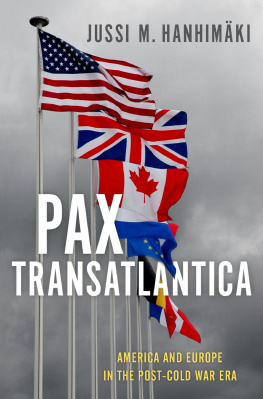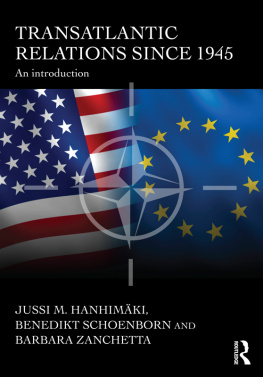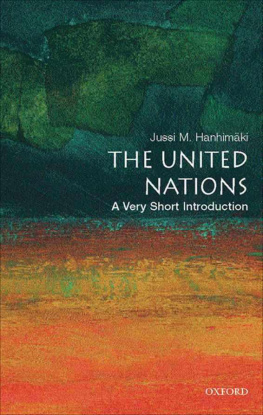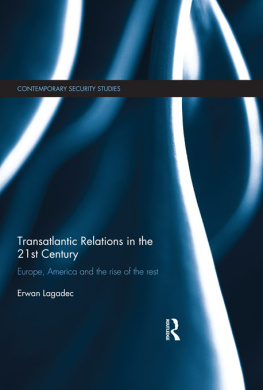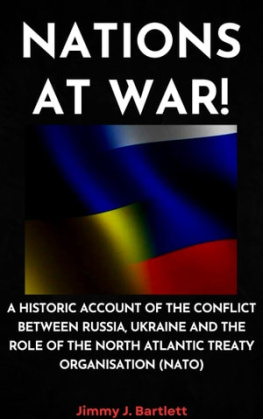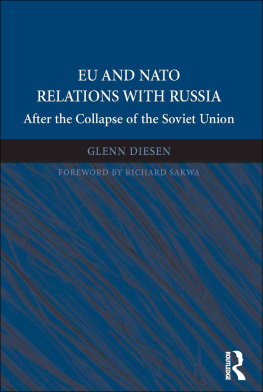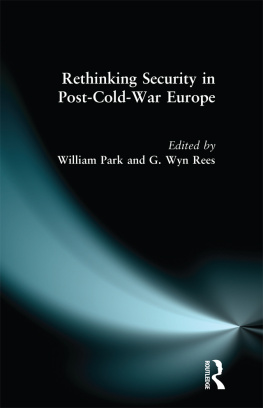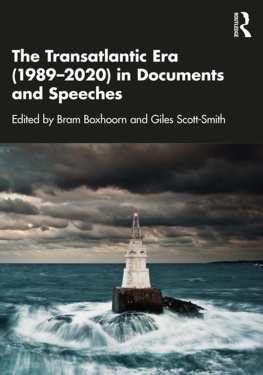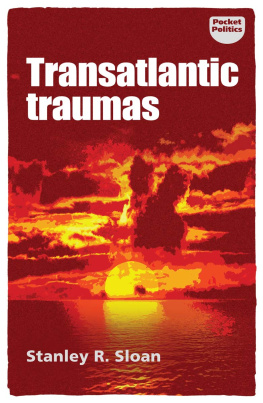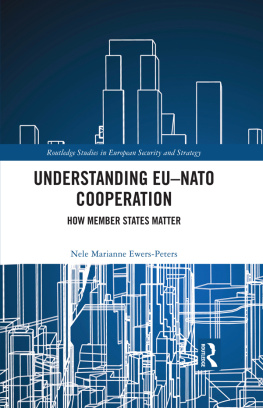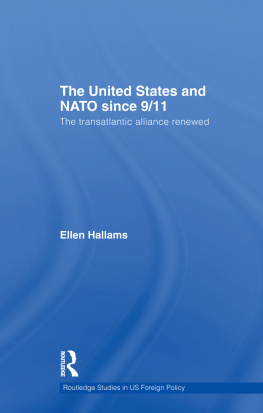Advance Praise for Pax Transatlantica
Hanhimki, one of the leading historians of international relations, has written a refreshingly optimistic book in the midst of the pervasive pessimism and gloom created by the coronavirus pandemic. In extraordinarily concise fashion, he provides rich historical context and perspective to the intricate wayspolitically, economically, and in terms of securitythe United States and Europe are bound together in what he calls Pax Transatlantica, a community that embraces both conflict and cooperation, always seeming to be on the verge of crisis and decline, but still persevering and enduring. A brilliant and incisive treatment of one of the most fundamental features of international life in the twenty-first century.
Thomas Schwartz, Professor of History and Political Science, Vanderbilt University, and author of Henry Kissinger and American Power
Hanhimki enjoys a unique advantage as an author. He knows the American and European sides of the transatlantic relationship supremely well, but as a Finnish-Swiss double citizenin his words, a super-neutralhe also maintains critical distance from both sides. This unique vantage point enables the author to examine todays economic, political, and security issues with a fresh eyeshowing how, as he wisely puts it, the transatlantic relationship is a great success story that is always on the brink of catastrophe. Highly recommended for scholars and general readers alike.
Mary Elise Sarotte, author of The Collapse
Hanhimki has produced a concise, well-argued study of recent transatlantic relations, which exposes the fact that its recent troubles are neither unique nor new. For those seeking a sound overview of the field, they would be hard-put to find something better.
Alan Dobson, Professor of Politics, University of Dundee
Also by Jussi M. Hanhimki
The Flawed Architect: Henry Kissinger and American Foreign Policy (2004)
The United Nations: A Very Short Introduction (2008, 2015)
The Cold War: A History in Documents and Eyewitness Accounts (2004, with Odd Arne Westad)

Oxford University Press is a department of the University of Oxford. It furthers the Universitys objective of excellence in research, scholarship, and education by publishing worldwide. Oxford is a registered trade mark of Oxford University Press in the UK and certain other countries.
Published in the United States of America by Oxford University Press
198 Madison Avenue, New York, NY 10016, United States of America.
Oxford University Press 2021
All rights reserved. No part of this publication may be reproduced, stored in a retrieval system, or transmitted, in any form or by any means, without the prior permission in writing of Oxford University Press, or as expressly permitted by law, by license, or under terms agreed with the appropriate reproduction rights organization. Inquiries concerning reproduction outside the scope of the above should be sent to the Rights Department, Oxford University Press, at the address above.
You must not circulate this work in any other form and you must impose this same condition on any acquirer.
Library of Congress Cataloging-in-Publication Data
Names: Hanhimki, Jussi M., 1965- author.
Title: Pax transatlantica : America and Europe in the post-cold war era / Jussi M. Hanhimki.
Description: New York : Oxford University Press, 2021. |
Includes bibliographical references and index.
Identifiers: LCCN 2021004647 (print) | LCCN 2021004648 (ebook) |
ISBN 9780190922160 (hardback) | ISBN 9780190922184 (epub) | ISBN 9780197516690
Subjects: LCSH: EuropeForeign relationsUnited States. | United StatesForeign relationsEurope. |
EuropeForeign economic relationsUnited States. | United StatesForeign economic relations
Europe. | North Atlantic Treaty Organization. | PopulismEurope. | PopulismUnited States. | Europe
Politics and government1989 | United StatesPolitics and government1989 |
World politics1989
Classification: LCC D1065.U5 H259 2021 (print) | LCC D1065.U5 (ebook) | DDC 327.4073dc23
LC record available at https://lccn.loc.gov/2021004647
LC ebook record available at https://lccn.loc.gov/2021004648
DOI: 10.1093/oso/9780190922160.001.0001
To Barbara, Jari and Alexandra
The signposts of my transatlantic journey
Contents
Tables
Charts
The events described in this book mirror my own adult life experience.
I left my native Finland in 1987. The one-year student exchange at Boston University turned into a long transatlantic adventure amid some unexpected global transformations. By the time I finished my PhD in 1993, the Soviet Union, the presence of which had shaped so much of twentieth-century world (and Finnish) history was no more. In 1995, when I landed in the United Kingdom to take up my first real job as a lecturer in international history at the London School of Economics, the European Union (EU) had been formed. It was billed as the embodiment of what George H. W. Bush, Americas last Cold War president had, a few short years earlier, called a Europe Whole and Free. As a citizen of one of the new member states of this emerging civilian superpower, I felt a distinctive transformation, a new belonging of sorts. No longer a borderland between east and west, Finland was firmly anchored in a community of like-minded states. And, perhaps because of my eight-year North American experience (that included a two-year stint in Canada), or possibly because I now lived in a country that still seemed to cling to its fabled special relationship with the United States, I sensed that this community was something bigger. It was decidedly transatlantic.
Five years later, in 2000, I moved again. This time it was to the heart of Europe but outside of the EU. It hardly mattered. In my two decades in Geneva, Switzerlanda city that lives and breathes internationalismI became increasingly convinced that a thriving and growing postCold War transatlantic community existed. On September 12, 2001, I was astonished to read the headline of Le Monde, the French newspaper known for its skeptical attitude toward the United States: We are all Americans (Nous sommes tous Amricains). The same day, in response to the terrorist attacks in New York and Washington, the North Atlantic Treaty Organization (NATO) invokedfor the first and so far the only timeArticle 5, the alliances collective defense principle. A few years later, on May 1, 2004, I witnessed the lure of the transatlantic creed firsthand in Budapest when Hungary, already a member of NATO, joined the EU alongside nine other countries. Many of them had been part of the Warsaw Pact. Three were successor states of the Soviet Union (Estonia, Latvia, Lithuania). With the exception of the small Mediterranean island nations of Malta and Cyprus, all new entrants to the EU also joined, if they had not already done so, NATO. If someone had suggested to me fifteen years earlier that this was bound to happen, I would have considered him or her terribly misinformed if not outright delusional. Yet, as more NATO and EU enlargements followed, the expansion of the transatlantic communitythe Westseemed almost preordained.
All of the above has little scientific merit. It justto use a phrase that has become commonplace more recentlyfelt true. It felt true that there was a transatlantic community because almost everything and everyone, myself included, could move so seamlessly between Europe and North America. It felt true that there was a transatlantic community because the concerns about the effects of globalization were expressed in such similar ways on both sides of the Atlantic. It felt true because the political passions of Americans and Europeans had so much in common, particularly as populism emerged as a powerful force in the 2010s.

